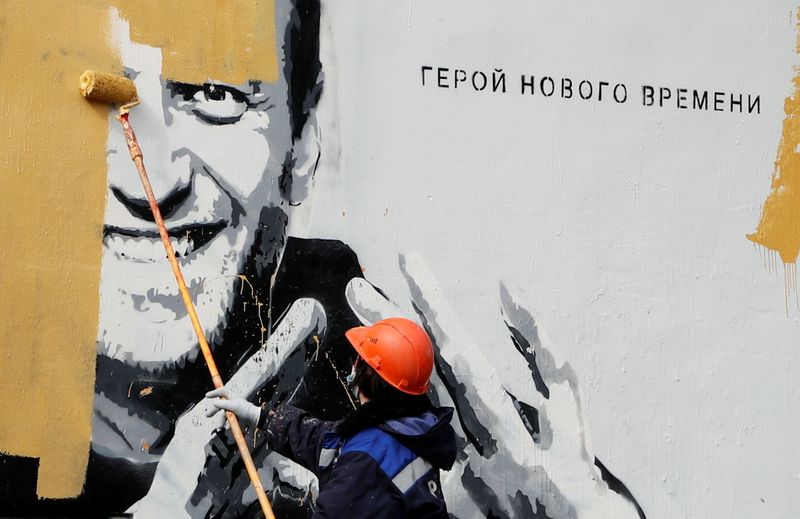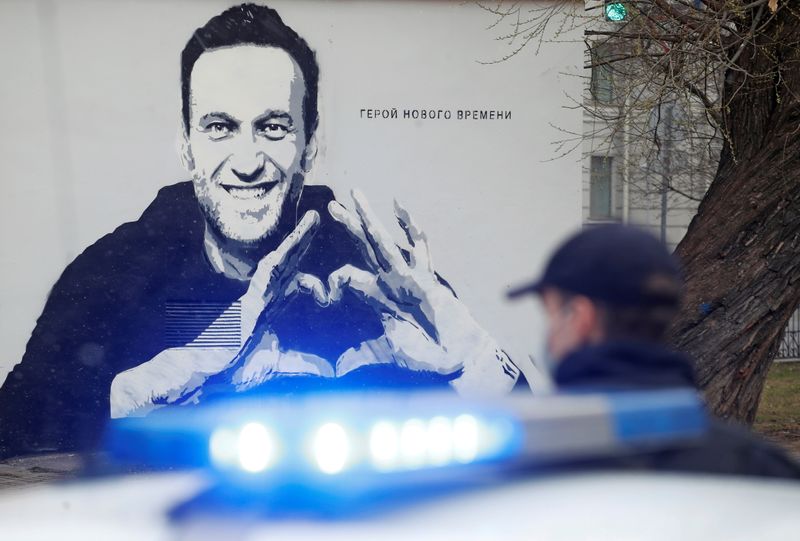By Andrew Osborn, Anton Zverev and Tom Balmforth
MOSCOW (Reuters) - He has been poisoned, jailed and his close aides are either being prosecuted or have fled abroad. His anti-Kremlin opposition movement is now also likely to soon be outlawed as extremist.
Yet Alexei Navalny and his supporters continue to work on ways to remain a thorn in President Vladimir Putin's side, even as one of his most important financial backers says the movement in its current form is finished and will take time to rebound.
In the eyes of the Kremlin, the only half-meaningful political weapon the Navalny camp has left is its campaign for tactical, or what it calls "smart" voting against the ruling United Russia party in a parliamentary election in September, according to three people close to the Russian authorities.
Navalny's supporters are set to be barred from that election via a court case, due to unfold later this month, and planned legislation unveiled on the parliamentary website on Tuesday that would ban "extremists" from running for office.
A court, meeting in secret, is considering a request from Moscow prosecutors to have Navalny's network designated "extremist" for allegedly plotting a revolution, state media have reported. Russia's financial monitoring agency has already added the network to a list on its website of groups involved in "terrorism and extremism".
In response, Navalny's movement has redoubled its call for sympathisers to vote for other opposition parties in September, however unpalatable they may consider them.
Dmitry Medvedev, the chairman of United Russia, has said the party, whose rating has been languishing at multi-year lows, needs to work hard to win another parliamentary majority. It won 343 seats of the 450-seat lower house of parliament or Duma in 2016, with the Communist party, ultra-nationalist Liberal Democratic party and smaller groups making up the rest.
Abbas Gallyamov, a former Kremlin speech writer turned political analyst, said the Navalny camp's smart voting strategy could mean an embarrassing defeat for the Kremlin's favoured candidates in many cities.
But a second source close to the authorities, who declined to be named, said it would just be an exercise in shuffling the same pack of Kremlin-controlled cards.
"The kind of parties and candidates that Navalny's people will try to help are ... in the Kremlin's pocket," the source said, pointing to the failure of other parties to threaten Putin's hold on power for more than two decades.
"Everything will be alright (for us)."
The Kremlin and Putin say Russia's election system is competitive, that Navalny and his allies are part of a U.S.-backed effort to destabilise Russia, and that the Russian leader, who has been in power as president or prime minister since 1999, remains the most popular politician by far.
The Kremlin did not immediately respond to a request to comment on whether it considered "smart" voting a threat and had influence over opposition parties that will run for parliament.
A third source close to the Kremlin described the Navalny camp's strategy as an irritant capable of causing some political damage but nothing that could seriously harm the ruling party's standing.
DRIVEN UNDERGROUND
Leonid Volkov, a Navalny ally, told followers on Facebook (NASDAQ:FB) on April 29 the expected court ruling meant it was no longer safe to operate regional campaign headquarters, which are used to stage protests which have mostly been crushed with force.
Announcing their official disbanding, he said some would close but that others would try to make it on their own as independent structures by cutting ties.
If Navalny's network is declared extremist, the law states that group organisers could face jail terms of up to 10 years, activists could be held criminally liable and anyone making donations could be jailed for up to eight years.
Investigations by his FBK anti-corruption foundation, some of which have generated tens of millions of YouTube views, are continuing to be produced outside Russia, with the latest, about state media organisation RT, issued on April 28.
Prosecutors want to designate the FBK as extremist too.
Navalny's activities are bankrolled by crowdfunding and he has several major donors, including Boris Zimin, who last year paid for Navalny to be evacuated to Germany from Russia after he was poisoned with what doctors said was a nerve agent.
Zimin told Reuters he did not know whether he would still donate funds.
"The state has enough measures at its disposal to stop any activity. So no doubt the authorities will stop the FBK in its current 'version'," he said. "But I trust this is not the end of the day."
Yevgeny Chichvarkin, a London-based Putin critic who has donated in the past, was more equivocal.
"I will definitely give bitcoin," he told Reuters.
Sending funds in bitcoin, or via platforms such as PayPal or YouTube, makes payments more difficult to track.
Yet bitcoin donations to Navalny's allies appear to have fallen in the last two months, according to websites detailing transactions.
In February, donations to bitcoin wallets associated with Navalny's campaign headquarters totalled $34,686. In March that figure was $9,880 and in April $24,600. Bitcoin is highly volatile and these amounts were based on the exchange rate on the day the money was transferred.
'NO LONGER A PROBLEM'
Volkov cast the latest legal move against Navalny's movement as evidence the Kremlin was scared.
"You've got no answer against smart voting idiots," he wrote on Twitter on May 4.
Volkov told Reuters he would comment on the movement's prospects at a later date.
Navalny has a high profile in the West, which imposed sanctions on Moscow over his poisoning last year in what Western leaders said was a Russian-sponsored assassination attempt. Moscow denies any role.
Despite this, the second source close to the Kremlin said it did not regard Navalny, 44, as a serious threat any more.

He would serve out his 2-1/2 year sentence for parole violations, the source said. "For now, he is no longer a problem."
